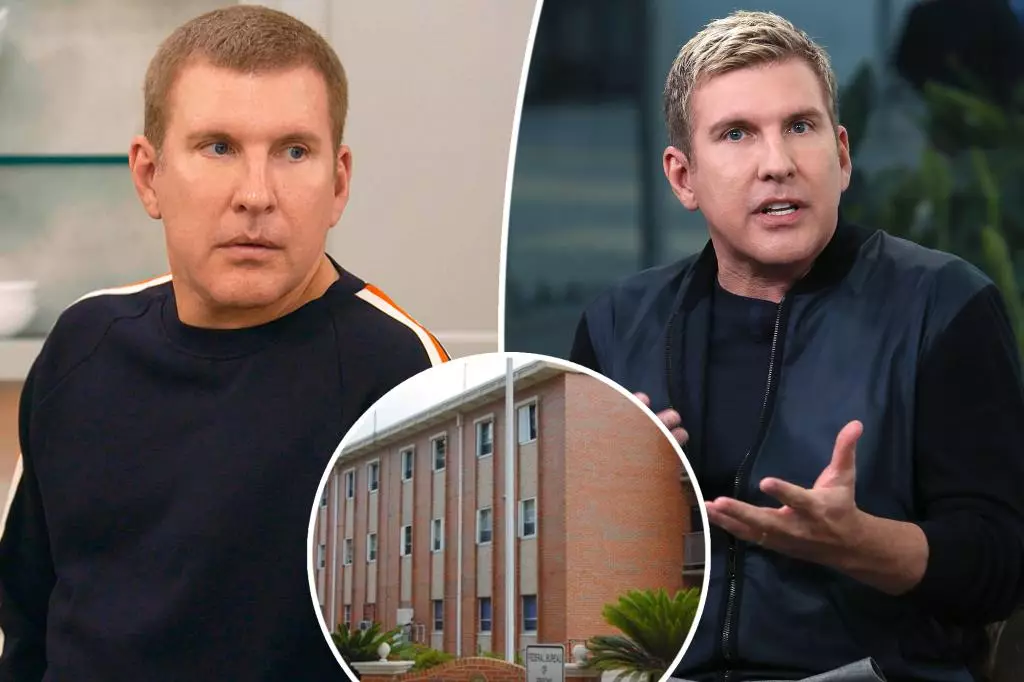The saga of Todd Chrisley, once a colorful figure gracing television screens in the popular reality show “Chrisley Knows Best,” has taken a somber turn as he navigates life in prison. Currently serving a 12-year sentence for bank fraud and tax evasion, Chrisley has faced a new challenge recently as he lost his volunteer position within the prison chapel, sparking discussions about the inmates’ treatment and systemic issues in the penitentiary system.
According to his attorney Jay Surgent, Chrisley was recently dismissed from his role as an administrative assistant to the chaplain at the Federal Prison Camp Pensacola in Florida. This position, which he held voluntarily for almost two years, allowed him to play a part in the spiritual life of the prison and contribute positively to the environment. The dismissal reportedly stemmed from allegations that Chrisley was speaking with participants of the Residential Drug Abuse Program, an action deemed inappropriate by prison officials. Notably, Surgent emphasized that Chrisley had received no prior warning regarding this behavior, nor was there any indication of dissatisfaction from the chaplain regarding his performance.
This event raises serious concerns regarding the transparency and fairness of disciplinary actions within correctional facilities. It begs the question: what constitutes a violation in the eyes of prison administrators, and how are these rules communicated to inmates? Chrisley’s experience signifies a troubling lack of clarity around prison regulations, which can leave inmates feeling helpless and vulnerable to arbitrary decisions.
The fallout from Chrisley’s legal troubles extends beyond his prison experience; it has had profound implications for his family, particularly his daughter, Savannah. As she has openly communicated, the repercussions of her father’s incarceration reach far and wide, affecting both their personal relationship and her family’s public image. Her advocacy for prison reform serves dual purposes: it attempts to shed light on the systemic issues affecting her father and supports broader movements for change in the justice system.
In her revelations, Savannah expressed her concerns that her activism has led to retaliation against her father. Such claims highlight a crucial issue in the prison system, where advocacy for reform or voice against mistreatment can have serious repercussions for inmates. This aspect of their experience illuminates the emotional turmoil faced by families of incarcerated individuals, who often grapple with not only the fear for their loved one’s safety but also the stigma of the prison system.
A significant portion of Chrisley’s ongoing ordeal revolves around unverified claims regarding the prison’s conditions. Reports have surfaced indicating that the food served at the facility is substandard, with Chrisley himself recalling alarming instances, such as a dead cat allegedly falling into the food supply. Such graphic accounts underscore the urgent need for reform within correctional facilities, as they can severely affect the physical and mental well-being of inmates.
Furthermore, the presence of vermin, such as rats and squirrels, in food storage areas highlights the hygiene and health standards, or lack thereof, in the prison. Inadequate living conditions can contribute to a cycle of violence, health issues, and emotional distress among inmates, complicating an already challenging environment.
The case of Todd Chrisley is a multifaceted reflection of the broader systemic issues plaguing the penal system. From opaque disciplinary proceedings to inadequate living conditions and the profound effects on family dynamics, Chrisley’s situation epitomizes the struggle faced by many within the system. As discussions surrounding prison reform continue to gain traction, the experiences of individuals like Chrisley can serve as pivotal anecdotal evidence in advocating for changes that prioritize fairness, transparency, and humane treatment.
Ultimately, as we witness the evolving story of Todd Chrisley, it is vital to consider not only the implications of his individual actions but also the profound systemic issues at play within the prison system itself. His experience can serve as a critical reminder of the human cost associated with the justice system, demanding our attention and necessitating reform.


Leave a Reply